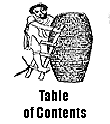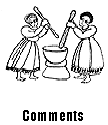
|
Rants
by: LT
I wish someone had warned me that grief felt like a terminal state of terror - insidious and untimely in its visits, desensitizing in its touch, and marvelously intoxicating. Then again, no one warned me about death on my horizon - no ominous nothing, no foreshadowing hilm. No, never her. After all, my beloved was immortal.
Surely, not a second goes by when I don't feel that agonizing emptiness she caused me. Sometimes, though, grief is so considerate, for the sake of everybody else, as to leave delusive gaps in my periods of epileptic suffering. I say for the sake of everybody else because normally, we don't like being around anything remotely associated with death. A part of us becomes vulnerable when faced with this forbidding and inescapable reality. I have been there. When the father of an acquaintance passed away, less than a year before my beloved, I was far from a good Samaritan. My stomach tumbled every time I saw her - not so much because I felt sympathy for her, but more because of a bloodcurdling fear that it could have happened to me. And therein lies the vulnerability. Yet there was no harm on my part in penning a "sympathy" card, or sending quick and intermittent "my-prayers-are-with-you-let-me-know-if-you-need-anything," e-mails. In fact, it was more self-gratifying and reassuring for me because it hushed the latent, disturbing voice that murmured every time I saw her: "What if this happened to you, child?" Yes, death is ugly, grief is stigmatized, and "support" seems to be found not amongst the people you normally call friends, but in institutions or groups of people who know so well what it means to mourn. Or maybe I'm just unlucky. Nonetheless, just like my gracious acquaintance, I forgave friends and their limitations because I, too, lived up to my limitations before.
So what about the slashes after the spaces? Ahh. Just as her love defied definition, so does the price I pay for it. Since describing it would be reductionist, let me just say they're real and unpredictable, these stabs; the unexpected mention of Her name, a fool satisfying her curiosity by asking how it happened, the mail and no exhilarating LelliyE fQr, the answering machine I tucked away in which I saved as many of her messages as I could. And me, me, me. Me reminds me of her. It so connects me with her. Not because people tell me I am like her. I can't imagine any part of my identity, not before and not ever, that is formed independent of her. For her birthday two years ago, I sent her a wall ornament that read: "All that I am or hope to be I owe to my mother." It's so painfully true and hard to live with now.
But sometimes, when I'm lucky, the slashes are so numbing that they kind of feel good, like an anesthetized hangover that you can't sleep off. It feels so much better to remove the mask, cry alone, and allow myself to freely become my own burden.
Almost five months after my beloved's passing, I am back in college, for the sake of compliance and cooperation, and most importantly, in the name of a very, very thin and shaky hope that she is something, somewhere right now. You know, I used to believe that I was a woman of faith. I absorbed Scripture with zeal and I studied theology with discipline. I believed that all great men and women had to be people of some cultivated spiritual heritage. These things mattered to me, but did they really matter to me? Did I believe in God because my beloved did? Did I conveniently call myself a Christian because she gave me that name?
In all honesty, I know now that I have never really, and I mean really, believed in anything. I realized this because my faith has become a matter of life and death for me. And as diligently as I have been searching for God, things just don't seem convincing enough. The vintage Christian in me tries to absorb the beatitude, "Blessed are those who mourn for they shall be comforted." It promises me of that reunion on the other shore; that her shimmering eyes still and evermore watch and inspire me; that she is an angel with God right now resting in a better place. But the lost "believer" in me desperately begs for a sign that she reigns out there somewhere.
A dogmatic friend of mine echoed the Bible and corrected me in saying that we are supposed to be so in love with God that our only desire should be reunion with Him alone, that nothing else should matter to us. But is God so self-indulgent as to make me exclusive to Him, and request of me to do the same? Is Heaven a realm where each soul exists in union with God and independent of each other? If that is the scenario, I am so ready to cease believing in God, to become an almost martyr for my beloved because I would, in all shameful honesty, rather be without God, than be without Her. How can my Love for my beloved be such a helpless victim of time and circumstance? Is the Author of Love so separatist? Her final words in our last conversation were that I was her reason for living. I never imagined that she would become mine.
And grief still feels like something terminal.
|




